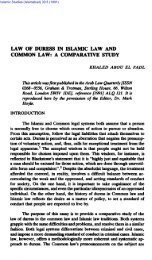ORPHANED GRANDCHILDREN IN ISLAMIC SUCCESSION LAW
ORPHANED GRANDCHILDREN IN ISLAMIC SUCCESSION LAW
ORPHANED GRANDCHILDREN IN ISLAMIC SUCCESSION LAW
You also want an ePaper? Increase the reach of your titles
YUMPU automatically turns print PDFs into web optimized ePapers that Google loves.
<strong>ORPHANED</strong> <strong>GRANDCHILDREN</strong> <strong>IN</strong> <strong>ISLAMIC</strong> <strong>SUCCESSION</strong> <strong>LAW</strong> 267<br />
But this hypothesis does not seem to be sustainable. The theory<br />
behind the 1961 Pakistan law is that from the moment of B's death<br />
her daughter C (in the case in question) assumes her rights. In this<br />
case, under classical law, the entire amount would have gone to A.<br />
In the obligatory bequest system (by all three methods) as well as<br />
the inheritance by right system, the granddaughter C will receive<br />
113 and A will receive 213 as residuary.<br />
In classical law, if B had died two minutes after P, C would<br />
have received only 3 of her mother's 4 inheritance, namely 116, and<br />
the remaining 3 of 3 would have also gone to her uncle A, but on<br />
the basis that C assumes B's rights from the time of B's death, C is<br />
fully entitled to B's share of P's estate, namely 113.<br />
Case 2<br />
In this case Anderson shows the contrast between the classical<br />
system and the 1961 system.15 P leaves a daughter A and a grand-<br />
daughter C by a predeceased son B. In classical law A receives 314<br />
(initially 3 and then 114 by radd or "return") and C receives 114<br />
(initially 116 and then a further lj12 by radd). The 1961 Pakistani<br />
law allots C, her father's share of 213 (on the principle of double ,<br />
share to the male) and 113 to A. This is entirely consistent with<br />
the view that the orphaned grandchild C assumed her predeceased<br />
father's rights from the time of his (B's) death. At the time of B's<br />
death, A may well have moved into another immediate family (of<br />
her husband) and importance is consequently given generation-<br />
wise to the agnatic line from P to B and then to C, where it peters<br />
out a generation later. The 1946 Egyptian law, however, undecided<br />
as to the status of C, does not give her the full bequeathable one-<br />
third or the (213rds) amount her father would have been entitled to<br />
(although in some other cases either of these methods of calculation<br />
would have been employed), but restricts C to what classical law<br />
would have allotted to her, namely 114. Incidentally this situation<br />
would be fortunate for the deceased's testamentary wishes which,<br />
presumably, would not be affected under the 19% law in such a<br />
case.<br />
Case 3<br />
Here,16 P is survived by A, his brother and C his granddaughter<br />
by a predeceased son B. In classical law C would receive her<br />
maximum .) and the remaining .) would then go to A, her father's<br />
uncle.
















